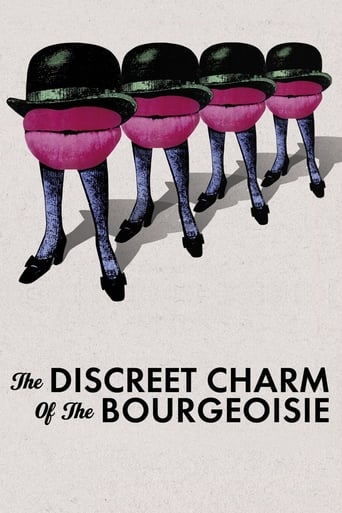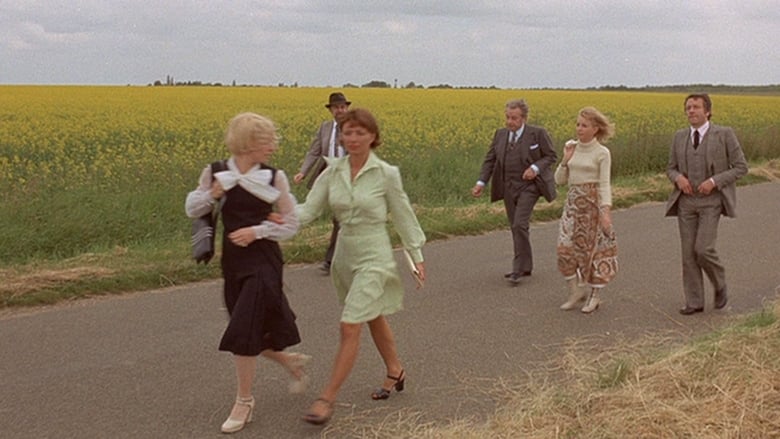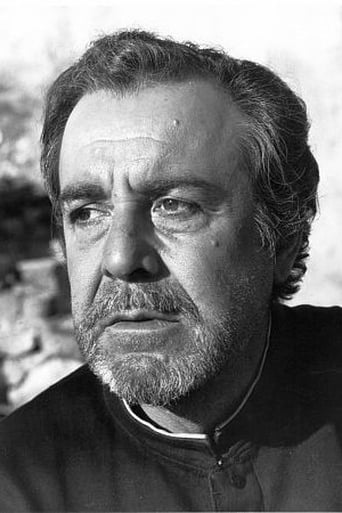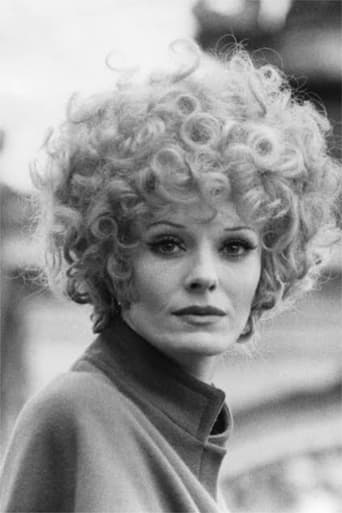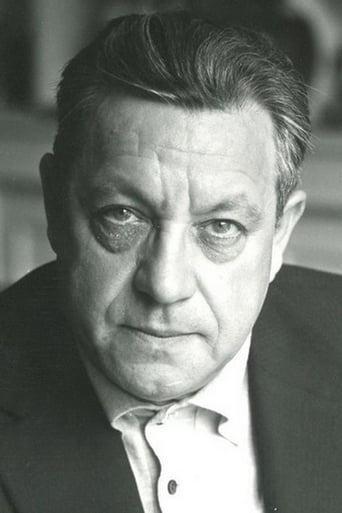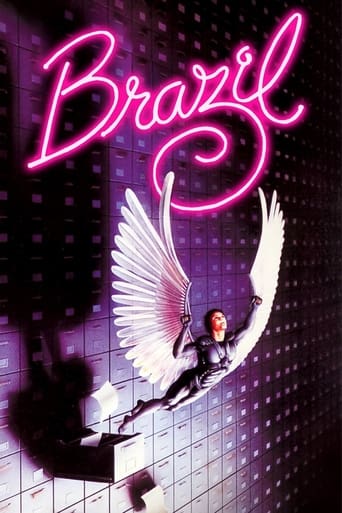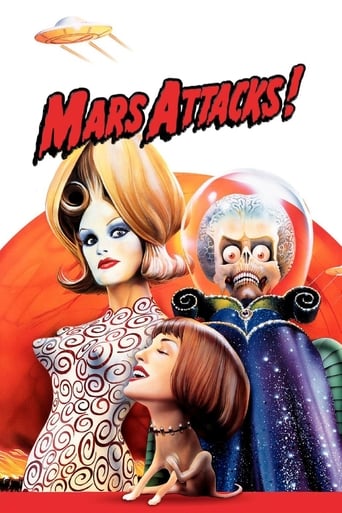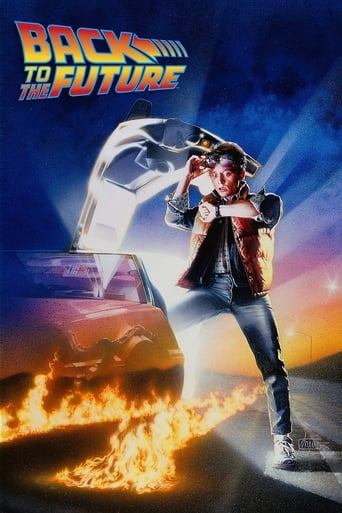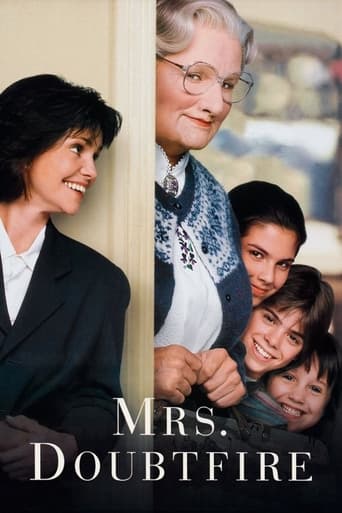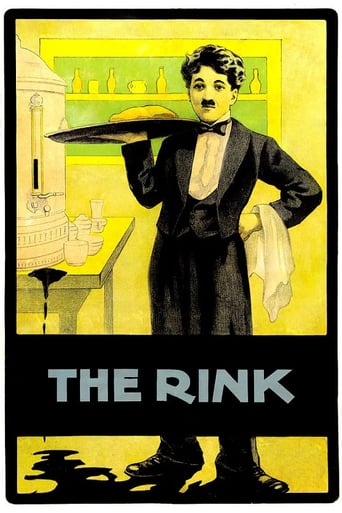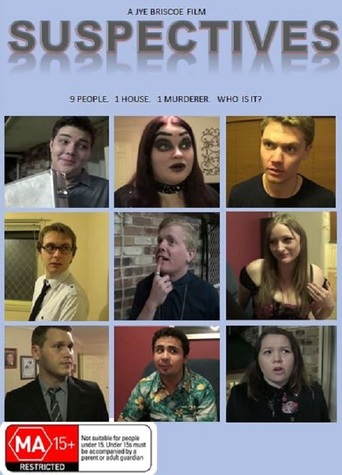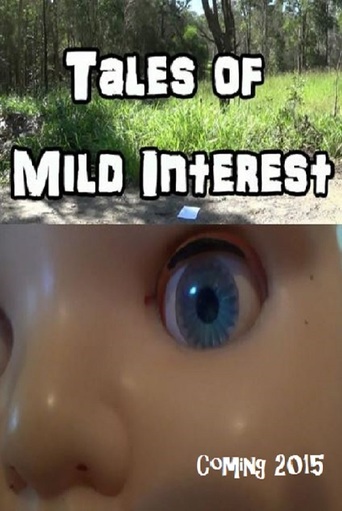The Discreet Charm of the Bourgeoisie (2022)

In Luis Buñuel’s deliciously satiric masterpiece, an upper-class sextet sits down to dinner but never eats, their attempts continually thwarted by a vaudevillian mixture of events both actual and imagined.
Watch Trailer
Cast


Similar titles
Reviews
or just cruel. but this is not a real surprise ! because it is a Bunuel portrait of a fake world and manner for survive. about desires, search, rules all in a dark satire in which dreams and fears, games and food are mixed. a picture. interesting for the art of a great cast. nice for meeting with a remarkable director themes. charming for the strange humor. a film about need to escape from yourself. about a way without end. and, sure, about masks. nothing else. only fog of a social group and a game with surrealistic nuances. it is good occasion to understand not only art of Bunuel but spirit of a time. and to understand the essence of society of each period.
This movie forms a trilogy with the earlier "Exterminating Angel" and the later "Phantom of Liberty". They are all concerned with that stereotypically "modern man" termed the "bourgeoisie". How does Bunuel characterize this social phenomenon in this movie? Surprisingly, not as harshly as he does in the other two movies of the trilogy.The Discreet Charm does not have a prologue {as in the other two in this trilogy} but opens up with the two couples arriving in a chauffeur driven limousine. The VIP whose vehicle it is , is the ambassador for the fictional Latin American state of "Miranda" {in Spanish this name denotes "admirable" and here Bunuel's cynicism is clear}. The ambassador is corrupt, and like many Colombian diplomats of the time, was using his supposed "diplomatic immunity" to smuggle cocaine into France. The other two French citizens are his accomplices. They do not use the drug themselves but instead liberally dose themselves with the legally acceptable bourgeois drug "alcohol"In a series of humorous and teasingly droll sketches, Bunuel illustrates how these corrupt men and their colluding female partners act out their empty lives of hypocrisy and deceit.. There class snobbery is clearly demonstrated,when the Bishop dressed as a gardener is evicted from the house, but on reentering in his official clerical costume, he is immediately embraced. The bourgeois, always insecure about their own position in society, are always making presumptuous judgments about the social positions of other people, making their lack of substance obvious. Throughout the movie, the continual lack of social concern in their relationships, as emotionally connected human beings, is made clear. The metaphor of "breaking bread together", one of the most intimate of human experiences, is continually subverted by rampant egotism and selfish desires.The scene when Bunuel has the dining table become a stage with a prompter giving them their lines, {as in Shakespeare's As You Like It "All the worlds a stage, and all the men and women merely players'}, is a brilliant confirmation of the emptiness of the bourgeois existence - simply stunning in its honesty {and so opposed to their inherent dishonesty}.Other facets of the devious nature, of the bourgeois personality, pursued by Bunuel in this movie, are the paranoid dream and thought constructions, used to resolve problems {a pernicious form of dishonesty} and the recurrent theme of the six bourgeois characters walking on the open road - "The Road to Nowhere".Bunuel devoted three whole movies to unmasking this scourge of human greed and existential poverty. The Surrealist program saw a revolution in human society as a prerequisite of a better world for all. Bunuel remained true to this creed throughout his artistic life. This movie is funny and entertaining. I can think of no greater compliment to give it.
Years after directing the surrealist movie "Un chien andalou", Luis Buñuel made "Le charme discret de la bourgeoisie" about a group of upper-class people whose attempts to have a nice dinner get repeatedly interrupted. The movie is simultaneously a bizarre comedy and a mockery of the bourgeoisie's materialistic attitude towards life, and a really good one at that. To crown everything, the characters accept the events, no matter how weird things get! Fernando Rey, hot off playing one of the villains in "The French Connection", plays a diplomat from the fictional Latin American country of Miranda*. People address him about the gap between rich and poor, and about his government's use of excessive force against protesters, and meanwhile a terrorist (revolutionary?) follows him everywhere. He comes across as a slimy guy, but you can't help but admire him.The scene where everyone walks towards an unspecified location seems to reflect the lives that this bunch of people leads in general. Their wealth deprives them of any purpose in life, and so they are left wandering, metaphorically speaking.All in all, I definitely recommend this one. Also starring Paul Frankeur, Delphine Seyrig, Bulle Ogier, Stéphane Audran and Jean-Pierre Cassel.*While there is no country called Miranda, there is a Mirandese language spoken in northeast Portugal. Just a side note.
Six upper middle class jerks attempt to meet for dinner on a number of occasions and find themselves caught up in many a farce. In "The Discrete Charm of the Bourgeoisie", the everyday becomes entangled with dream at every turn. The reality of the drug running foreign ambassador comes into direct conflict with the guerrilla forces his domestic policies engender, the gardener monseigneur of the church ends up taking confession from his parents' murderer while the culprit is on his deathbed, the cocktail party hosted by a general breaks down into a small battle in his dining room, a sexually frustrated couple are forced to elude their company and couple out in the garden, an afternoon luncheon is turned into an audit of fratricidal confession from a young army lieutenant. At every crossroads, the pretentious "civility" of professional society finds itself disrupted by the casual violence and mayhem that underscores their class privilege. Bunuel's use of the nightmare tells the audience what the bourgeoisie knows very well: they know what a bunch of casual gangsters they actually are, and sleep will not let them hide from themselves. And none of the charm of the bourgeoisie will be enough to break them away from their ongoing isolation from themselves and nature, expressed very cleanly by Bunuel's repeated image of the six professionals, in semi-formal dress, walking down a country road in the middle of nowhere. And it's all very funny, in an unfunny sort of way.Bunuel's masterpiece holds up well, almost forty years after its release. Here's a farce that demonstrates just how far a "satirist" like Sasha Baron Cohen ("Borat") really has to go before he has anything substantial to say with farce or film.

